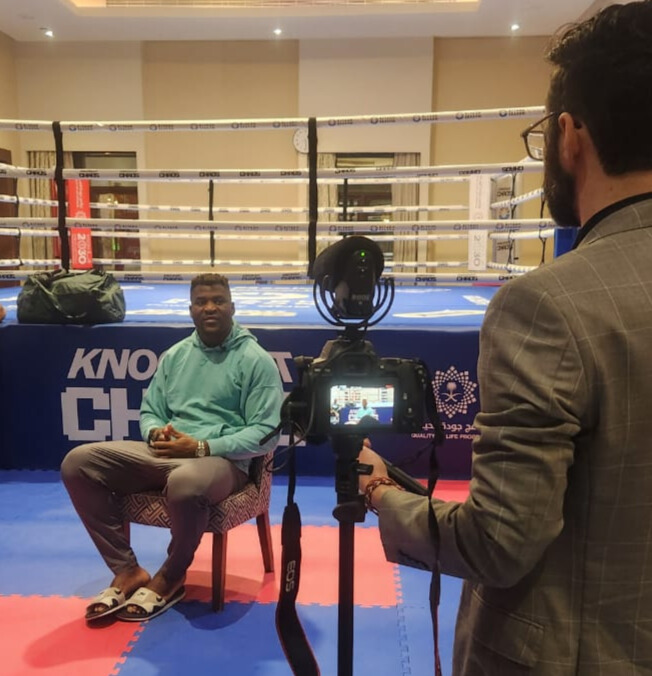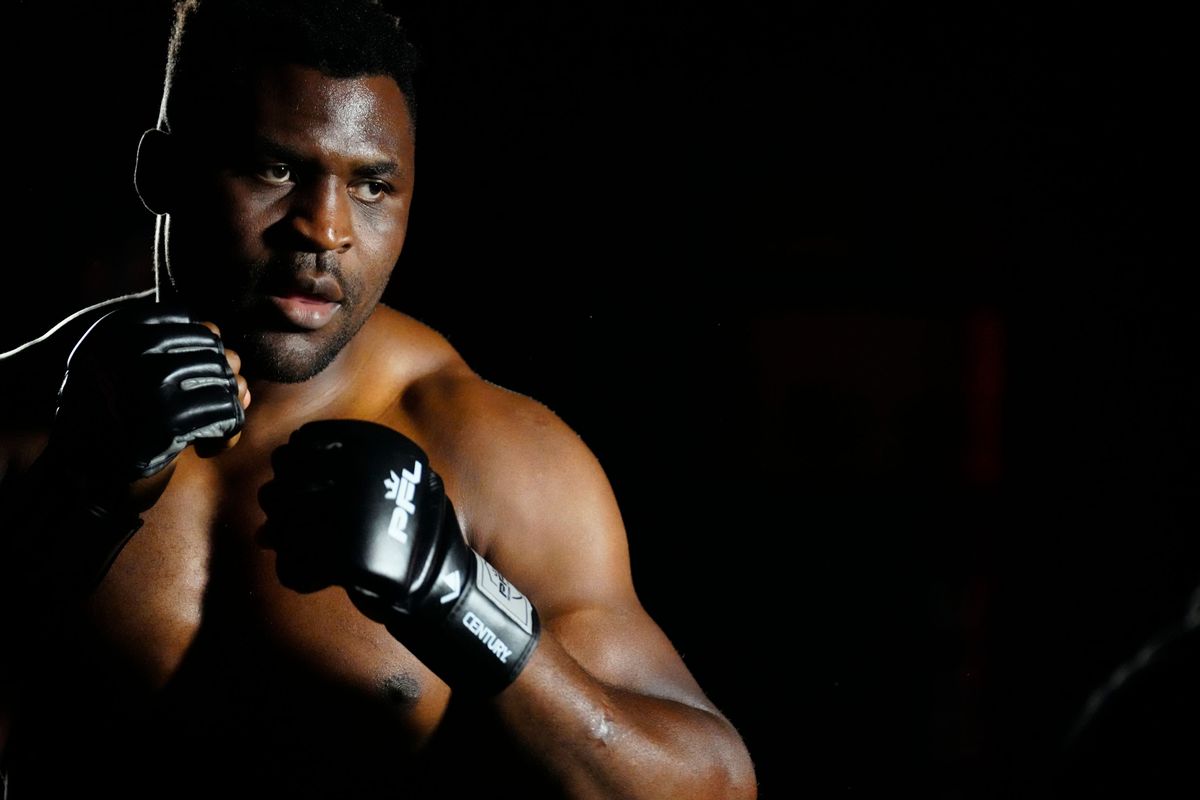Francis Ngannou has come a long way since dreaming of a better life in Cameroon. The Cameroonian athlete met with Tim Wheaton of Combat Press, and a few other select media members, for an interview.
After crossing Africa, and being homeless in Paris, he became an MMA fighter after hoping to become a boxer. Instead of boxing, he captured the UFC heavyweight title and defended this crown. Ngannou was unable to come to terms with the UFC, so he bet on himself. He signed with the PFL, with plans of the PFL African expansion, and can take on all boxing matches.
Last year, he shocked the world when he took on the boxing king Tyson Fury. Ngannou won rounds and scored a knockdown but lost a narrow decision. On Mar. 8, he will face British boxing icon Anthony Joshua. Then, later in 2024, Ngannou will come back to MMA to face the unified champion between the PFL and Bellator which will be decided on Feb. 24, Renan Ferreira or Ryan Bader.
Ahead of his fight and this weekend’s PFL vs. Bellator event, both hosted in Riyadh, Saudi Arabia, Ngannou discussed several things. Most notably, his plans for expansion and giving hope to the youth in areas such as the Middle East and Africa.
Interview with Francis Ngannou
Tim Wheaton: Bonjour Mr. Ngannou. How does it feel the Riyadh Season is kind of created from what you started?
Francis Ngannou: Well, I didn’t create it. I was part of it, of it. I was one of the main people in it, but it feels great. It came at the moment that I was, you know, I just decided to take a new step and was just figuring it out and then this came to be a perfect fit, perfect institution. And my spot was just open. So I just get in.
TW: Life worked out pretty well, eh?
FN: Life always works out pretty well. When you believe. Most of the time you will let the storm maybe disturb you. You will get unstable by the storm. And then maybe that can create a doubt in your mind or stuff like that. But if you stay still, you will find out that life is always good.
TW: You won a kickboxing title in Paris several years ago. What is your memory of that one kickboxing fight?
FN: It was It was in Perpignan, in fact, in France. Well, I remember it was a moment that I just wanted to fight. I was very excited, was very hungry, and was training all the time. I wanted to fight. My kickboxing wasn’t great though.
TW: But, you won!
FN: Yeah, but I was just like, I have the will to win. I was going there for everything. It was quite a good experience.
TW: Another one for you on Kickboxing. I know Glory had sent you an offer last year-
FN: No, no. I never received an offer from Glory.
TW: I was the guy who wrote the story as well. I’m gonna have to correct that.
FN: [Laughs] Oh, really? Yeah, no. I never received an offer from Glory.
TW: Who do you have, Tyson Fury or Oleksandr Usyk?
FN: I would go more for Tyson Fury. I got Tyson Fury, and to be honest, I want him to win. I want the rematch to be there for the undisputed title.
TW: Number one in the world, right?
FN: Yeah, always aiming high.

Media: Wanted to ask what the PFL is doing in Saudi at the moment, and then what they’re looking to do in the Middle East region. Just how special is that, in terms of what they’re gonna do for them, for the whole MMA world, the whole space there?
FN: I think the PFL has adopted a great strategy in terms of creating PFL regionally and then getting people more involved. When you have an event, centralized in one place, of course, it’s gonna be in different prime times around the world. And then most of the time people don’t feel it. Like, for example, if you have somebody from Saudi, fighting in the US in the global PFL, it’s hard for the Saudis to watch that fight, even though they want to support him. Not only because he won’t be in time, they will also have a broadcast issue to collaborate. You know, it’s the whole process to go through. And they are not even sure that they’re gonna engage in that conversation for a broadcast, right? For only one fight or for only one guy, and maybe after two fights. You don’t know what’s gonna happen. So it’s a lot of drama. Now they bring it regionally and then it’s for the region, right?
You have people for the region, kids from the region that have seen that and want to be there, and then seeing people that maybe they’re training together or that they’re in the same gym. Going to the event maybe 10 of them. 20 of them in the same event. Then they create a huge ecosystem and a huge engagement to people to fight that.
So I think it’s a great strategy. And I’m speaking, I know all about that, because that was even before the PFL Regional came out and they talked about PFL Africa. It was a plan that I, for the past, like maybe five years I’ve been trying to develop in Africa. So I created something. How to create more engagement and then build talent in Africa. And then the PFL came, was obviously the perfect fit with all our vision alliance, together. And everything was just great.
Media: Francis, could you see, obviously it might be some time down the line, but can you see some champions in the PFL, and other organizations, coming, from this region?
FN: Absolutely. Absolutely. So what you have to understand is that this model is going to help to develop talent, right? They’re gonna be hosting events in this region, for example. Now, a kid that is training maybe was just like training for passion or like, okay, it’s cool, but it’s, we are not going to get there. They didn’t believe. Nowadays, belief comes, there’s a faith, there’s something real that is there. There’s opportunity there for them. You know, not the opportunity that they want to take part of, but the opportunity that is theirs. This going to create a whole ecosystem, develop bring a lot of interest even for coaches. People who have a good experience to teach, to come because there is an attraction here, and media as well.
And those kids, they’re gonna watch on TV and then sponsor. There’s an ecosystem that is being created. That’s the beauty of sports sport. It creates it own ecosystem to fit itself.
Media: In terms of what Saudi Arabia is looking to do in combat sports. You’re obviously involved with MMA and boxing. Just how special is it that the growth of combat sport in this region is, is going to have an impact on the rest of the world as well?
FN: For the past like maybe three years, there was talking about like a potential big fight in Saudi, boxing event. In the past year, look at the big events that have happened. Most of them are in Saudi. And what is up to come is gonna be in Saudi. So I think in terms of sport globally, the wind is blowing in this direction.
To be honest, I didn’t have any idea about this club before. But I followed Cristiano Ronaldo. This club is an elite league now. I was in the stadium the other day. They were kicking Inter Miami six-zero. [laughs]
Other clubs may have players that you might not know, but they are great players. The competition is tight, so things are moving.
Media: Speaking of the sports scene in Saudi Arabia, how do you see the MMA and the boxing scene here in Saudi Arabia?
FN: I would say more that recently it has been setting up for the future. More is gonna happen in like, maybe two, three years, five years. And I think the direction; things are moving. Moving here.
We can see that fighters now are coming here to fight. But what we don’t see is that at the same time, they’re building fighters here. Getting fighters excited here.
I’m training with Mike Tyson gym and there are local kids. They’re training. And some are really serious and really good. And I do believe that in five years those kids going to be the ones that are going to be on TV.
Saudis will not necessarily have to go outside to find fighters because they have built their own. And in the same thing in every domain, you know? So I see more in the future. The plan, the long-term vision, which is the most interesting.
Media: How do you mentally prepare for a high-stakes fight of this caliber?
FN: I don’t know. I train, yeah, I train. And when I have doubt, I train again and again and again and again. I put my confidence in my training. There, in the work that I have put in, and I believe that is going to pay out.
Media: Your legacy was shaped and based in the West. Now with your name being recognized and tied into the Middle East, what do you hope to be remembered as in this region?
FN: hope to be remembered as a great athlete. The person who stands up for himself. And does everything. Never back down, never give up. Be a dreamer. Because dreams are free. I’m allowed to dream and I keep dreaming. I don’t give my dream up.
Media: You represent Africa on the global stage. You were talking about African fighters and, and getting them into the game, the boxing and MMA game. How do you see that coming in the next few years, the next, decade or so?
FN: I think things are going in a very good direction. For example, the launch of PFL Africa. Because for so many years I was concerned about it, but was just by myself and couldn’t do anything.
Now I have it. A big hand, a big organization behind us. The PFL supports. They have the initiative and have the same vision as me. So that’s been shaking things up. Just the announcement shakes things up a lot, changes things a lot. A lot of people, kids now in Africa, are training to become a PFL fighter.
Not only that, through my foundation, I’ve been putting on a lot of events, professional and amateur events in Cameroon. Recently we did an event in the Ivory Coast. But just to keep kids motivated, to give them something. Do not give up on their dream because we are working on a plan and opportunity for them.

